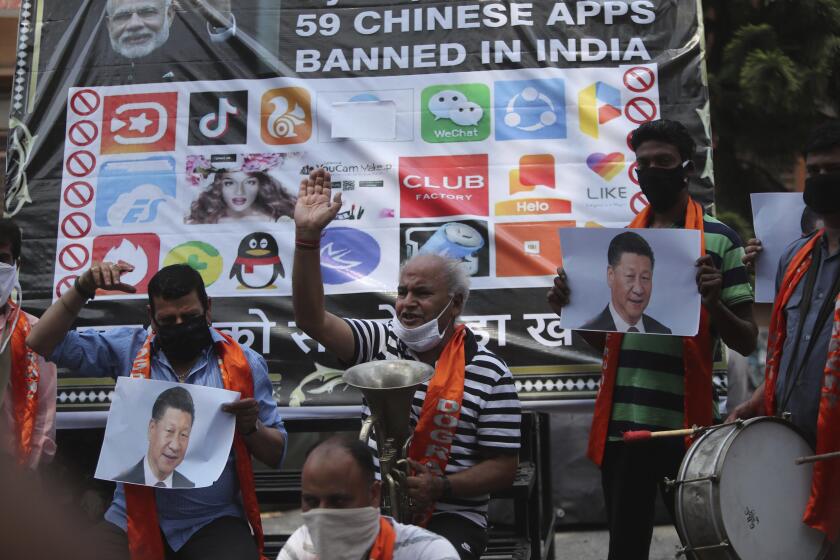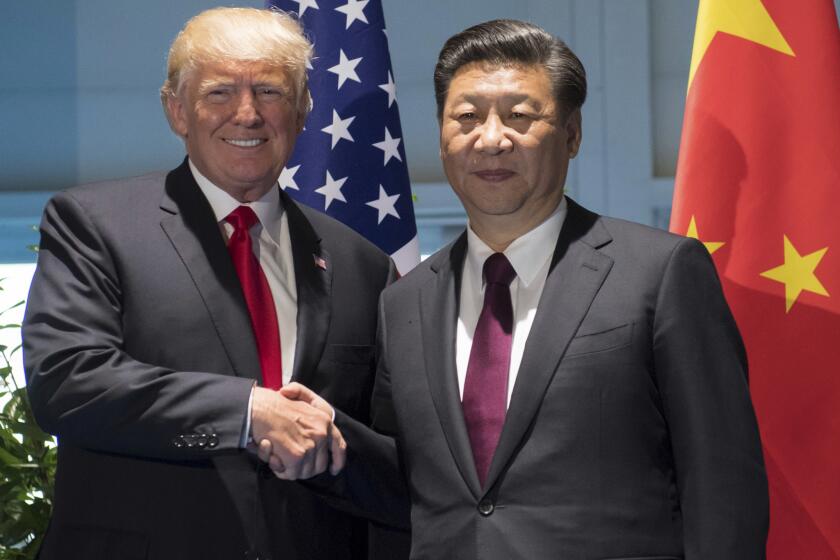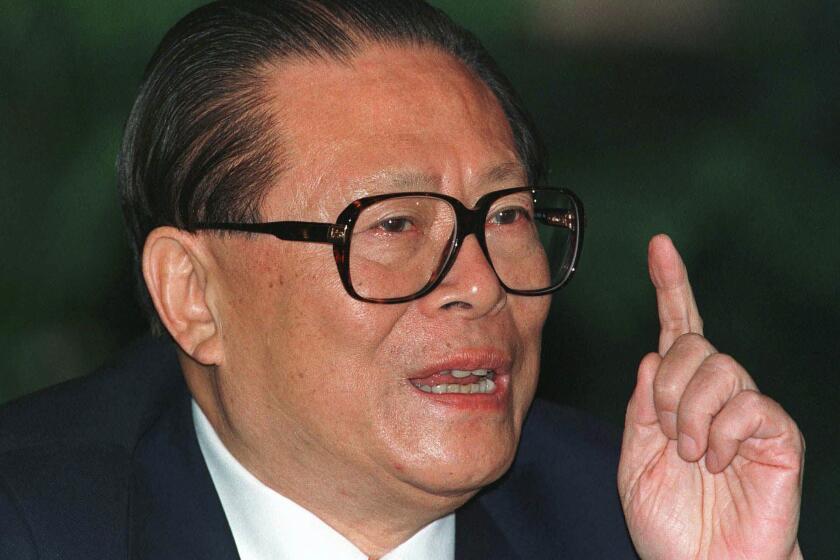Trump wants an ‘alliance of democracies’ to oppose China. It’s starting to take shape
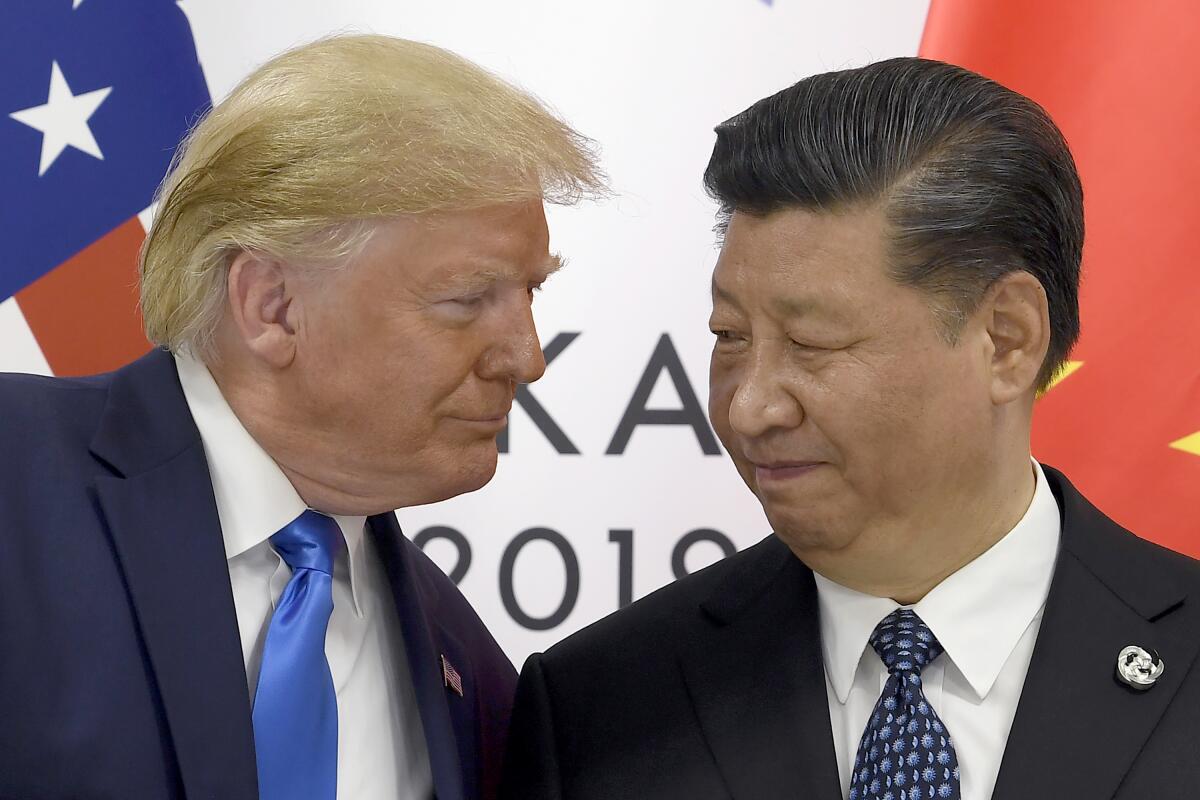
- Share via
SINGAPORE — Not since 1989 and the massacre of pro-democracy demonstrators in Tiananmen Square have Chinese leaders looked out at the world and seen so much hostility.
From Britain to India, Japan to Australia, and even among the usually deferential nations of Southeast Asia, China’s aggressive expansionism, trade warfare, alleged espionage, cyberattacks and COVID-19 propaganda have provoked a growing resistance toward President Xi Jinping’s ambition to build the world’s next superpower.
Bans on Chinese tech and software companies and joint drills by rival navies in the Pacific have buoyed the Trump administration’s effort to rally other nations against Beijing in what increasingly resembles a new cold war. The rift deepened this week with the tit-for-tat closures of consulates in the U.S. and China and Secretary of State Michael R. Pompeo’s call for “a new alliance of democracies” to oppose China’s “new tyranny.”
Such an alignment is beginning to take shape, instigated in part by an American president desperate to deflect widening criticism at home of his administration before the November election. But that could also play into the hands of Xi — his country’s most powerful leader since Mao Zedong — who has stoked an us-against-the-world nationalist fervor and painted the U.S. as a declining power bent on denying China its place as a global leader.
“There’s any number of developments that point to a much more concerted global pushback against China,” said Richard McGregor, senior fellow at Australia’s Lowy Institute. “Whether that has any impact on China and Chinese behavior, of course, is another question.”
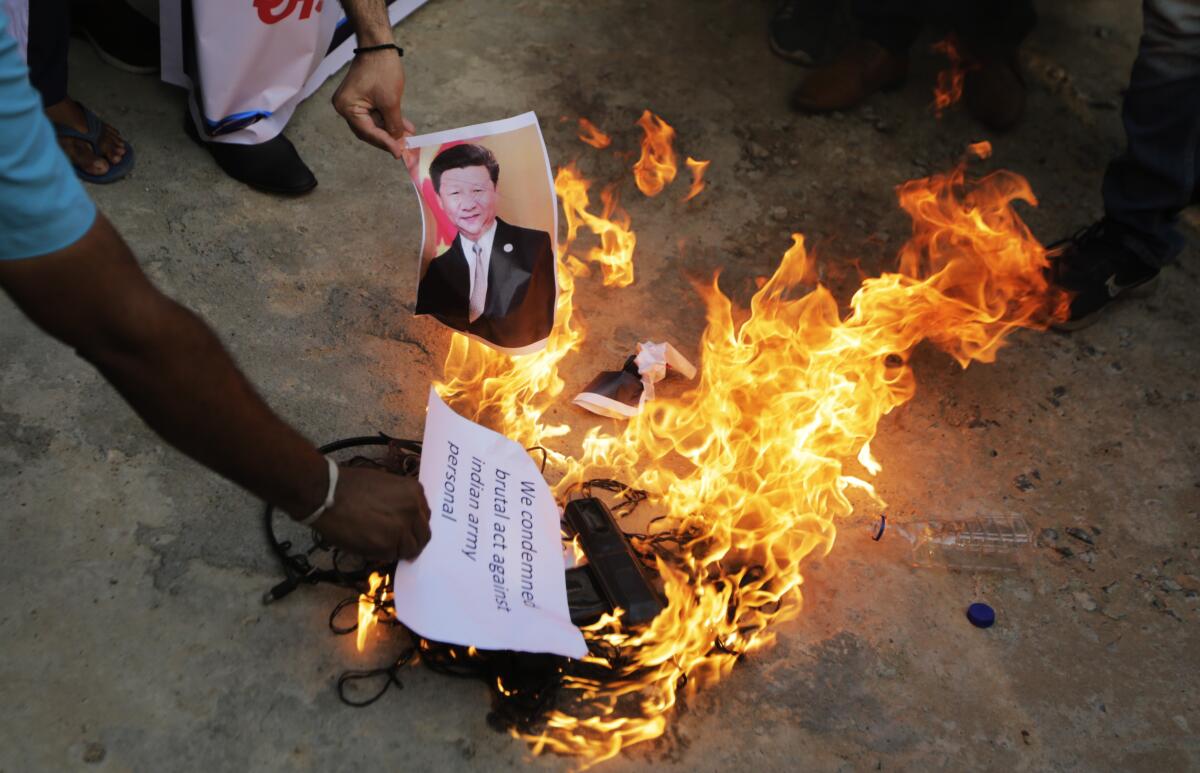
Some analysts believe the opposition could prompt the Chinese Communist Party to steel its resolve to protect its stature domestically, the party’s paramount concern. Others say commercial bans and sanctions could add pressure on China’s slowing economy — but not without disrupting world markets and costing nations that depend on Chinese trade and investment.
The U.S. is “launching a new crusade against China in a globalized world,” Hua Chunying, a Foreign Ministry spokeswoman, said on Twitter. She added that Pompeo’s strategy to create an alliance against China was “as futile as an ant trying to shake a tree.”
Still, the outlines of a broader, multi-nation alignment against Beijing are emerging — most clearly among democracies that had tried to accommodate China’s rise in the hopes of gaining access to its 1.4 billion consumers, supporting political reforms or placating a giant neighbor.
This year, even as the world grapples with the COVID-19 pandemic, China has asserted control over Hong Kong, engaged in a deadly border skirmish with India, flown military planes over Taiwan’s airspace, harassed or sunk several countries’ vessels in the South China Sea and launched a trade war with Australia.
Less than two weeks under a new national security law enacted by Beijing, Hong Kong residents already feel a curtain of control falling over the city’s realms of speech and thought.
Beijing even opened a new front in a long-running border dispute with the tiny mountain kingdom of Bhutan by laying claim to a 300-square-mile wildlife sanctuary that Bhutan has sought to have declared a UNESCO World Heritage site.
“China’s pugilistic behavior across numerous fronts is definitely occasioning a rethink of China policy among a cross-section of nations across the Indo-Pacific and in Europe,” said Nirupama Menon Rao, a former Indian ambassador to Beijing and Washington.
“Some of the hesitations and China-related sensitivity of the past years will be jettisoned.”
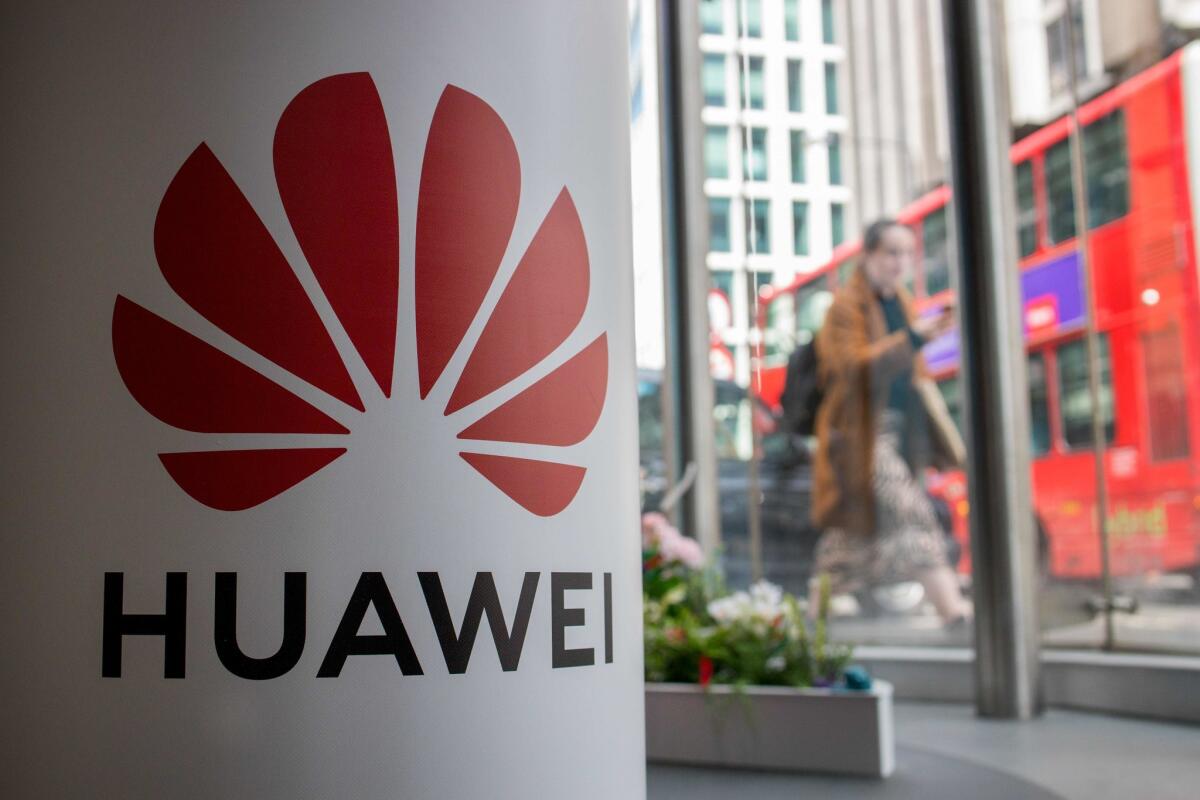
Britain this month banned the telecommunications giant Huawei from its next-generation 5G networks, bowing to intense Trump administration lobbying against the Chinese company it describes as a security threat. The move was a blow to China’s tech industry, already suffering under U.S. sanctions, and could foreshadow similar bans by European Union governments.
India and Australia, two democracies whose relations were long characterized by mutual indifference, signed a series of agreements in June to strengthen their military partnership. They committed to promoting an “open, free, rules-based Indo-Pacific region” in a joint statement that read as a direct response to China.
In May, after Australia led a push for an independent inquiry into the origins of COVID-19, China imposed stiff import tariffs on Australian barley and warned that other trade restrictions could follow.
Prime Minister Scott Morrison announced last month that Australian companies and government institutions were facing intensifying cyberattacks from a “sophisticated state-based actor” whom he didn’t name, but was widely believed to be China.
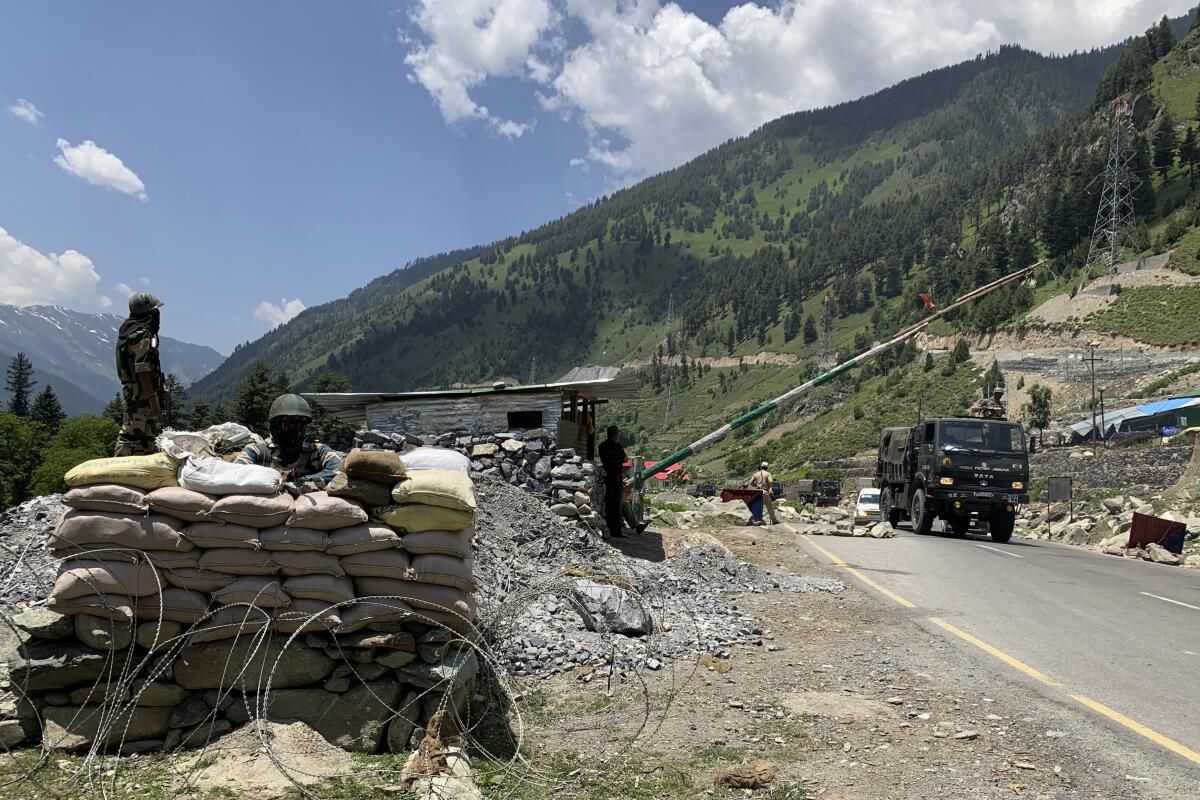
In June, New Delhi blamed the People’s Liberation Army for incursions along the disputed Himalayan border that led to a brawl in which 20 Indian soldiers and an unknown number of Chinese were killed — the deadliest clash between the neighbors in nearly half a century.
The Indian government responded with a ban on dozens of Chinese smartphone apps, but unconfirmed reports in the Indian media this month suggested a more provocative step could be coming: an invitation to Australia to join India’s annual naval war games known as Exercise Malabar, which include the U.S. and Japan.
The Chinese video-sharing app is booted from its biggest foreign market as India retaliates for a deadly border clash.
An expanded Malabar exercise would add a military dimension to the four countries’ so-called Quad grouping — an on-again, off-again security bloc that China views as a threat and has formally opposed.
The Quad had its origins during the response to the Indian Ocean tsunami more than a decade ago but fell apart when leaders were reluctant to be seen as ganging up against China. The four nations’ security establishments are warming to the idea again.
Japan — which proposed the first formal Quad talks in 2007 but then embarked on a fitful rapprochement with China — has lodged protests this year over the increasing presence of Chinese ships in its waters. This month, Japan’s Defense Ministry accused Beijing of using the pandemic to extend its influence and of “relentlessly” trying to undermine Japan’s control over the Senkaku Islands in the East China Sea.
“It was the absence of a counterbalancing force that made it easier for China to pressure every country individually and nibble away at territory,” said Sudarshan Shrikhande, a former head of Indian naval intelligence.
The Quad “may not be against China,” he added, “but we need not be embarrassed that it is about China.”
India’s traditional disdain for alliances, preference for Russian military hardware and economic protectionism have disappointed a succession of U.S. presidents who have tried to build a deeper partnership with the world’s most populous democracy. But India’s top diplomat, S. Jaishankar, said last week that the “era of great caution … is behind us” — raising the prospect of closer security ties with the U.S.
In Southeast Asia, more countries have begun to challenge China’s construction of military facilities on disputed rocks and reefs in the resource-rich South China Sea. Vietnam is reportedly considering filing a case against China at The Hague. Malaysia, Indonesia and the Philippines are strengthening their naval defenses against Chinese expansion.
Last month companies in Singapore awarded their major 5G contracts to Huawei’s European rivals. In a speech on Indo-Pacific security this week, U.S. Defense Secretary Mark Esper said he was “pleased to see the tide is turning” against Huawei and argued for greater multilateral cooperation “to bring us together … to defend the international rules-based order.”
But when the U.S. issued a statement this month siding with Beijing’s South China Sea rivals, the countries’ muted response reflected their reluctance to be drawn into the new cold war — and the difficulties of building a durable anti-China coalition.
The coronavirus is pitching the U.S. and China into a new Cold War -- a confrontation over ideology as well as trade and security. It’s happening partly because President Trump needs an issue to run on -- and it’s dangerous
Analysts say many countries that oppose China in individual disputes still want to maintain trade and diplomatic ties. The Muslim nations of Malaysia and Indonesia, for example, see China as a maritime threat but remain silent on China’s repression of Uighur Muslims.
“They all have a common interest in getting China to change its behavior, but there isn’t yet agreement on which is the worst behavior to change first,” said Drew Thompson, a former Pentagon official who helped oversee military relations with China.
“Each is still working to protect its own parochial interest in a bilateral relationship, rather than seeing it as a systemic challenge to regional stability and security.”
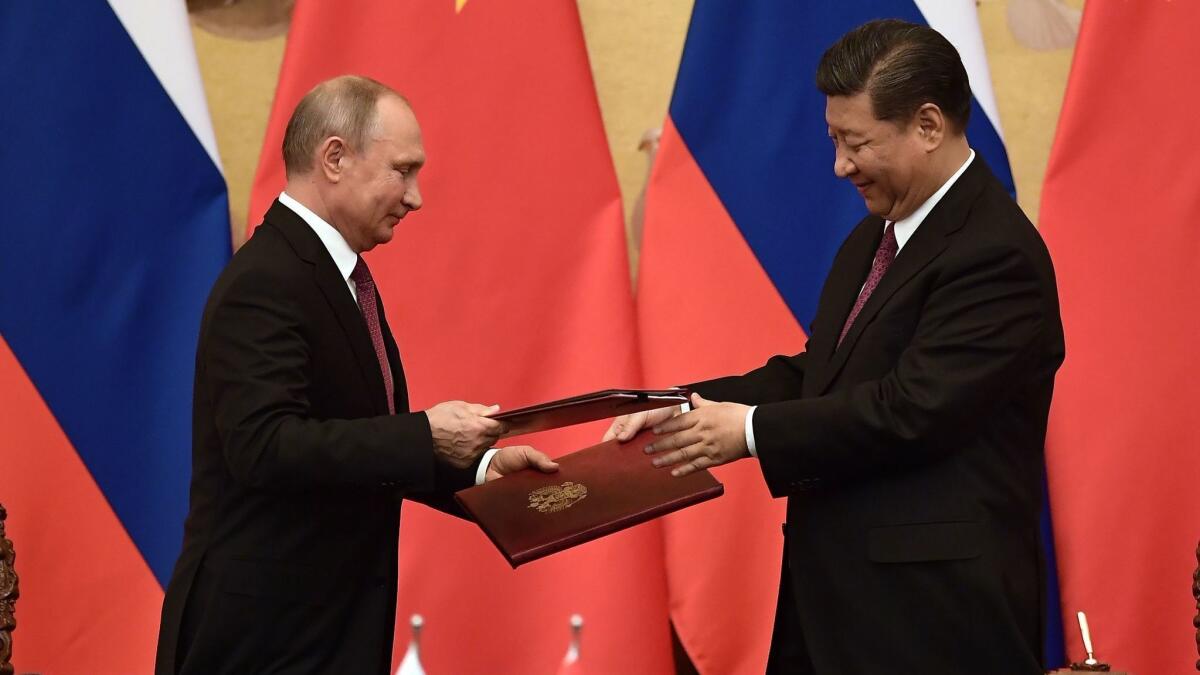
At the same time, China is drawing countries to its side in a shared hostility toward Western democracies. Beijing just concluded a major trade and security deal with Iran. Its long-standing ties with Russia were described in state media as the “cornerstone of global strategic stability.”
Like the U.S.-Soviet Cold War, this one is increasingly defined by an ideological clash between democracy and authoritarianism — which boosts Xi’s own narrative of the Communist Party’s supremacy, said Steve Tsang, director of the China Institute at the School of Oriental and African Studies in London.
“It wasn’t that long ago that Xi’s government was potentially facing a crisis of legitimacy because of the failure to contain COVID-19,” Tsang said. “What better way to rebuild that credibility than to present the evil others, the U.S., which fails to cope with the crisis and becomes more hostile toward China.
“So people rally around the party, and there is no more talk of a legitimacy crisis.”
More stories from Asia
If splitting the globe into competing alliances is also reminiscent of last century, analysts say today’s more interconnected world economy will create tough choices for nations. Trade-dependent EU countries are taking a far less confrontational — and somewhat tortured — approach toward China, describing it as both a “vital partner” and “systemic rival.”
“The difference between this cold war and the last one is the alignment and bifurcation are a lot more fluid,” said Alan Dupont, a leading Australian security strategist. “It’s a far more interdependent world now, and a lot of countries will not be in a single bloc. They’ll want to straddle both.”
And there remains, even among friendly democracies, deep skepticism of President Trump, who has openly disdained the same kinds of alliances he now seeks against Beijing.
In Australia, where a recent poll indicated that only half the people trust America to act responsibly in the world, analysts say the government views closer ties with countries such as India, Japan and South Korea as a hedge against the U.S. — no matter who wins the November election — losing further ground to China in the Pacific.
“In today’s world, China is very predictable. We know what they want,” the Lowy Institute’s McGregor said. “The unpredictable player is the U.S.”
More to Read
Sign up for Essential California
The most important California stories and recommendations in your inbox every morning.
You may occasionally receive promotional content from the Los Angeles Times.
